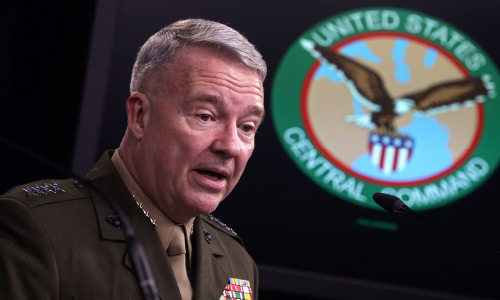WASHINGTON - The Commander of the U.S. CENTCOM Marine Corps, General Kenneth F. Mckenzie Jr., has said the Taliban attacks are still too high, warning that the Afghans would be forced to respond if the Taliban did not stop the attacks in another two or three days.
“Taliban attacks are not occurring against coalition forces, they’re not typically occurring in the cities and they’re not occurring against bases. They’re occurring against checkpoints and isolated locations across Afghanistan. But the level of attacks, in my judgment, is not consistent with a group that wants to pursue and be a — be a fair and faithful partner, going forward,” Gen. Mckenzie said in response to a question.
“So those attacks are too high. And we have noted — I’ve seen what the Afghans have said, if they don’t knock them off here in another two or three days, they’re going to begin to respond,” he said, adding that “So I think actually, the Afghan government has been remarkably restrained in responding to the Taliban attacks.”
Raising questions regarding the continued violence, Gen. McKenzie said “So the question is, do the Taliban attacks represent a core strategy of the group, they’re going to continue the attacks? Or is it a splinter of the group and are they not monolithic? We’re still assessing that.”
However, he said “If it’s directed from the top, then obviously that’s not a good thing. Because it shows that they’re not — they not acting in good faith.”
In regards to U.S. troops pullout from Afghanistan, Gen. McKenzie said “We are in the process of drawing down to a level of 8,600. I anticipate that we’ll arrive at that level by the middle of the summer. We believe that any further — as we go beyond this, it’s going to be a conditions-based approach. We have an aspiration to go to a zero level in Afghanistan, but that is very clearly going to be conditions-driven.”
The U.S. and Taliban group signed a peace deal late last month after observing a 7-day reduction in violence. The two sides signed the agreement after almost 18 months of negotiations in Qatari capital of Doha.
However, there are fears that the latest trends in Taliban attacks in remote parts of the country and the growing political tensions could undermine the peace process, specifically the launch of intra-Afghan peace talks.
The State Department had earlier confirmed that the Taliban group has taken steps to stop attacks against the coalition forces and in the cities but the group is still killing too many Afghans in the countryside.
Morgan Ortagus, a State Department spokesperson said the current high level of violence by the Taliban is unacceptable.
“We acknowledge the Taliban have taken steps to stop attacks against the Coalition and in cities,” Ortagus said in a statement, adding that “But they are killing too many Afghans in the countryside.”
She also added “This must change. Violence at these levels risks drawing both sides into a vicious cycle, serves no one, and undermines peace.” (KHAAMA PRESS)
Home » Afghanistan » ‘They’re Not Acting in Good Faith’, U.S. CENTCOM Commander Says Reacting to Taliban Attacks
‘They’re Not Acting in Good Faith’, U.S. CENTCOM Commander Says Reacting to Taliban Attacks

